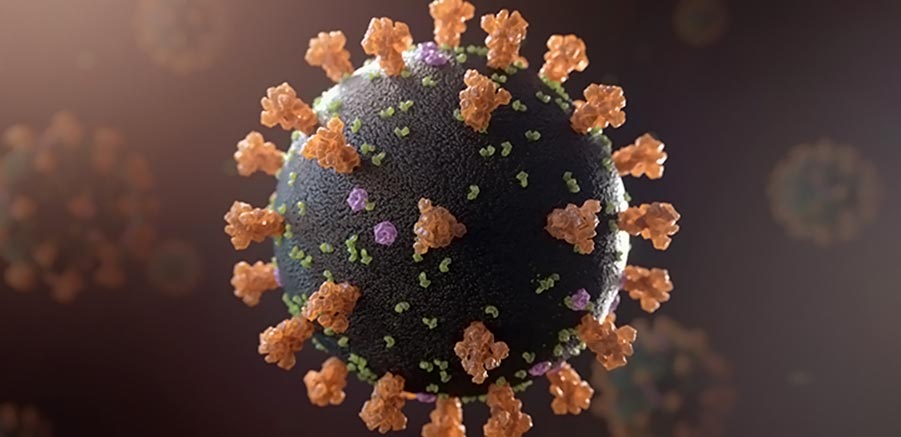

This artist’s rendering of a SARS-CoV-2 virus shows the membrane protein (green) and the envelope protein (purple) and the characteristic spike protein (orange). Credit: © KAUST; Xavier Pita
Understand the similarities between SARS and COVID-19 Inflammation could help in a clinical setting. A protein in viruses that cause COVID-19 and SARS is almost identical. The researchers propose tests if targeting COVID-19 with FDA-approved drugs, already tested in SARS-infected mice, could improve outcomes for COVID-19 patients experiencing severe respiratory symptoms.
The finding was a collaborative effort by the KAUST teams after a comparison of Betacoronavirus genomes. “We have long experience in analyzing genomic data at the KAUST Computational Bioscience Research Center,” says molecular biologist Takashi Gojobori.
Gojobori, Carlos M. Duarte and a team of scientists compared the genomes of 24 Betacoronaviruses, including four SARS-CoV-2 virus, which causes COVID-19. Two of the four were sequenced in the United States, while the other two were sequenced in China.
“SARS-CoV-2 appears to have recently evolved from other related Betacoronaviruses, such as those that cause SARS and Middle East respiratory syndrome (MERS),” explains Intikhab Alam, first author of the study. “We wanted to understand the genetic makeup of SARS-CoV-2. Seeing what has changed could help you find ways to detect the virus and understand its rapid spread. Seeing what is conserved among these viruses could help predict whether the therapeutic approaches developed for other Betacoronaviruses might work in SARS-CoV-2, ”he says.
Their genomic comparisons followed by structural analysis found that a small protein that spreads across the viral membrane, called the E-envelope protein, is almost identical in SARS-CoV-2 and the SARS virus (called SARS-CoV-1 ).
A molecular component of this protein in the SARS virus helps trigger the release of substances that cause inflammation in its host. This inflammatory reaction causes fluids to accumulate in the lungs, resulting in shortness of breath, a condition called acute respiratory distress syndrome. Scientists studying the SARS virus have discovered that this reaction can be inhibited in mice by FDA-approved medications. “Medications that inhibit the E-envelope protein from previous SARS viruses should also block the protein in COVID-19,” says Alam. “Although these medications will not stop the spread of the virus, we hope they can attenuate or prevent acute respiratory distress syndrome and help save lives.”
###
Reference: “Functional analysis of pangenomes shows that the key characteristics of protein E are conserved in SARS and SARS-CoV-2” by Intikhab Alam, Allan A. Kamau, Maxat Kulmanov, Łukasz Jaremko, Stefan T. Arold, Arnab Pain, Takashi Gojobori and Carlos M. Duarte, July 27, 2020, Frontiers in cell microbiology and infection.
DOI: 10.3389 / fcimb.2020.00405
The team is now looking for partner hospitals in Saudi Arabia to conduct trials of these drugs. They also aim to use their data to aid efforts toward designing an effective vaccine. Their data is publicly accessible in its beta-coronavirus pangenome database. Like other research groups, they openly share the first COVID-19 related research with the World Health Organization.